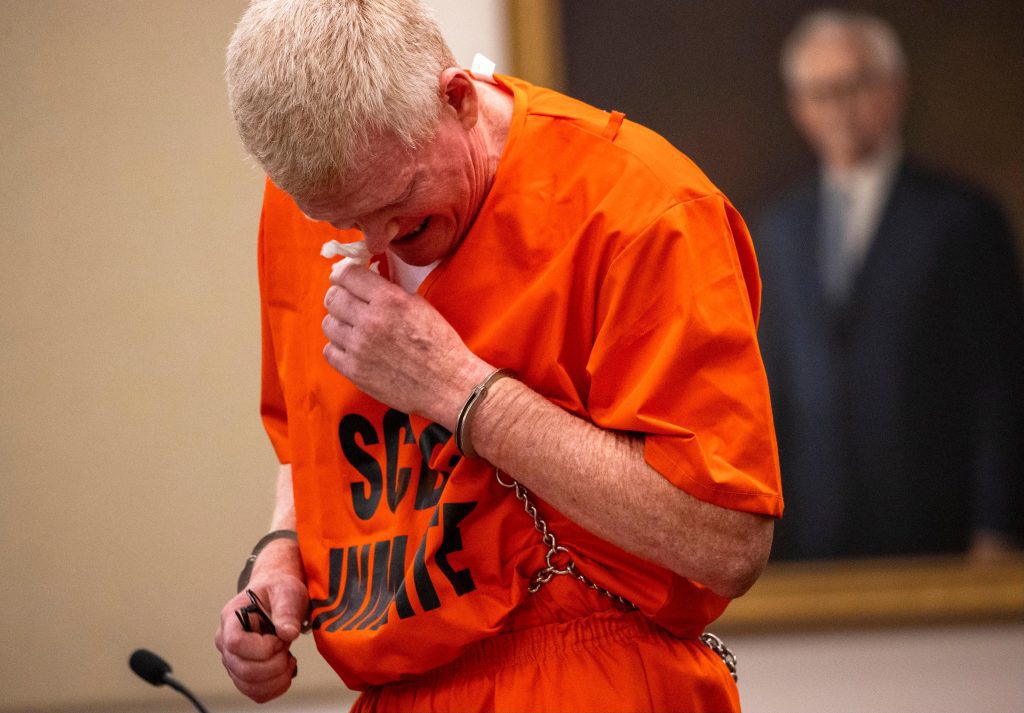By JEFFREY COLLINS (Associated Press)
In a courtroom in South Carolina, Alex Murdaugh, now in a prison jumpsuit, was sentenced to 40 years in federal prison.
The disbarred 55-year-old attorney was sentenced in federal court for stealing from clients and his law firm. He is already serving a life sentence without parole in a state prison for killing his wife and son.
A report by federal agents recommended a prison sentence between 17 1/2 and just under 22 years.
The 40-year sentence will add to his existing life sentence. Along with a 27-year prison term in state court on financial crime charges, the federal sentence will run concurrently with his state prison term, and he will likely serve all 40 years if his murder convictions are overturned on appeal.
U.S. District Judge Richard Gergel said he gave Murdaugh a harsher punishment than suggested because he stole from people in great need, such as a quadriplegic client, an injured state trooper, and a trust fund for children whose parents died in a wreck.
Gergel said, “They placed all their problems and all their hopes on Mr. Murdaugh, and it is from those people he abused and stole. It is a difficult set of actions to understand.”
The 22 federal counts are the final charges for Murdaugh, who was once a successful lawyer in Hampton County, negotiating multimillion-dollar settlements.
Murdaugh also has to pay nearly $9 million in restitution.
Prosecutors want a harsher sentence for Murdaugh because FBI agents believe he is not telling the whole truth about the $6 million he stole and whether a so-far unnamed attorney helped his criminal schemes.
Murdaugh’s biggest scheme involved the sons of his long-time housekeeper Gloria Satterfield. She died in a fall at the family home. Murdaugh promised to take care of Satterfield’s family, then worked with a lawyer friend who pleaded guilty in a scheme to steal $4 million in a wrongful death settlement with the family’s insurer.
In total, Murdaugh took settlement money from or inflated fees or expenses for more than two dozen clients. Prosecutors said the FBI found 11 more victims than the state investigation found and that Murdaugh stole nearly $1.3 million from them.
At his sentencing, Murdaugh apologized to his victims, expressing his feelings of guilt, sorrow, shame, embarrassment, and humiliation.
Similar to his state sentencing, Murdaugh offered to meet with his victims so they can express their thoughts and “more closely inspect my sincerity.”
Murdaugh stated, “There’s not enough time and I don’t possess a sufficient vocabulary to adequately portray to you in words the magnitude of how I feel about the things I did.”
Murdaugh attributed nearly two decades of addiction to opioids to his crimes and said he was proud that he has been clean for 937 days.
Gergel dismissed his blaming of drugs.
“No genuinely impaired person could successfully carry out these complicated transactions,” the judge said of the intricate web of fake accounts, manipulated checks, and money transferred from one place to another to conceal the thefts for nearly 20 years.
Murdaugh was found guilty a year ago of murdering his younger son Paul with a shotgun and his wife, Maggie, with a rifle. Although he has admitted to dozens of financial crimes, he vehemently denies that he killed them and testified in his own defense. The murder cases are expected to go through years of appeals.
The case has fascinated true crime enthusiasts, leading to numerous podcast episodes and thousands of social media posts. It continued its unusual turns in the days leading up to Monday’s sentencing hearing.
Murdaugh's lawyers stated that an FBI agent who administered a polygraph test asked Murdaugh if he could keep a secret, then revealed that he had just examined notorious Dutch killer Joran van der Sloot.
According to prosecutors who are seeking a harsher sentence, Murdaugh failed that polygraph test. Each of the 22 counts Murdaugh pleaded guilty to in federal court carried a minimum of 20 years in prison. Some carried a maximum of 30 years.
The defense claimed that Murdaugh's alleged peculiar behavior and unusual questions from an FBI agent led to his failure in the test.
Prosecutors aim to keep many of the FBI statements confidential, stating that they are still investigating the missing money and individuals who might have assisted Murdaugh in stealing it. They argue that making the information public would endanger an ongoing grand jury investigation.









